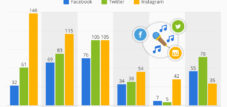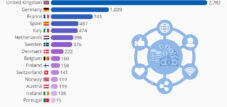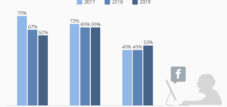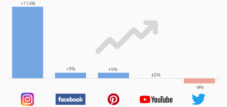The Great Social Media Collapse: Why Social Media No Longer Delivers Natural Traffic
Xpert pre-release
Language selection 📢
Published on: September 1, 2025 / Updated on: September 1, 2025 – Author: Konrad Wolfenstein

The Great Social Media Collapse: Why Social Media No Longer Delivers Natural Traffic – Image: Xpert.Digital
The Great Churn: Why Social Media Is Becoming a Dead End for Complex Products
### From newsfeed to shopping mall: The silent revolution that's changing your marketing ### TikTok dances instead of tech details: Is your B2B marketing on the verge of collapse? ### The 3-second war: How algorithms make sophisticated content invisible ###
No news, just shopping? Companies must now radically rethink their approach
Social media, once a digital marketplace for information, news, and professional exchange, is undergoing a fundamental and irreversible transformation. What was once considered a reliable channel for B2B communication and a source of traffic for news portals has morphed into a gigantic, algorithm-driven entertainment and shopping platform. This transformation is not a gradual development, but rather the result of conscious strategic decisions by giants like Meta, which are deliberately deprioritizing news and political content to focus on short videos and social commerce.
The numbers impressively demonstrate this epochal shift: Facebook traffic to news sites has plummeted dramatically, while formats like Instagram Reels and TikTok dominate the digital stage and shorten users' attention spans to a few seconds. At the same time, social commerce is exploding, establishing platforms like TikTok as powerful sales channels where impulse purchases are made directly within the app.
But while this development opens up new opportunities for consumer goods brands, it poses existential challenges, particularly for B2B companies, mechanical engineering companies, and providers of products that require explanation. How can complex, technical solutions be communicated when the algorithm only rewards quick, emotional stimuli? This article analyzes the deep-rooted causes of this massive exodus, highlights the concrete effects on various industries, and highlights which strategic adjustments are now necessary to survive in the new, fragmented media landscape.
Suitable for:
- Brand communication: What B2B can learn from B2C brand communication – new strategy with and for SME industry influencers
The Great Migration from Social Media – Shift to Entertainment and Social E-Commerce
Social media is undergoing a fundamental transformation that has far-reaching implications for how companies reach their target audiences. What was once considered a reliable source for news and B2B communication is increasingly evolving into a pure entertainment and shopping platform, which presents new challenges, especially for products and services that require explanation.
The dramatic decline in news traffic
The numbers speak volumes: Between 2023 and 2024, Facebook's referral traffic plummeted by a dramatic 48 percent, while X (formerly Twitter) saw a 27 percent decline. This development marks the end of an era in which news publishers relied on the continuous stream of passive users of social platforms. Organic traffic to news websites, which reached over 2.3 billion monthly visits in mid-2024, fell to under 1.7 billion by May 2025—a loss of more than 600 million monthly visits in just a few months.
This development did not occur by chance, but rather the result of conscious strategic decisions by the platform operators. Meta systematically deprioritized news and political content in order to focus more on entertaining formats such as short videos and avoid regulatory disputes. The abolition of the Facebook News tab in the US, Australia, and several European countries was the symbolic culmination of this strategic realignment. Meta justified this radical step by pointing out that usage of the news function had declined by over 80 percent and that users primarily visited the platform for social interactions and entertainment, not for news consumption.
The dominance of entertainment content
The shift toward entertainment-focused content is particularly evident in the development of short video formats. TikTok, Instagram Reels, and YouTube Shorts have become the dominant content formats, with Reels on Instagram generating 52 percent more impressions than other formats, while TikTok generates 84 percent more reach. The average user attention span is concentrated on the first three seconds of a video, forcing content creators to condense their messages to a great extent.
This development has fundamental implications for content strategy. While short videos of up to three minutes in length, originally only 15 seconds, allow companies to create creative content with music, effects, and filters, these formats are primarily suitable for easily marketable, visually appealing products. The algorithm-driven approach of these platforms favors content that generates immediate attention and leads to rapid interactions.
Suitable for:
- Part 1: Industry blog as a marketing engine: Authentic, informative, customer-oriented - targeted communication with the Xpert Hub
Social commerce as a new sales platform
Parallel to the focus on entertainment, social commerce is developing into a significant economic factor. Studies predict a global market volume of $1.2 trillion by 2025. TikTok has established itself as a powerful e-commerce tool with campaigns like "TikTok Made Me Buy It," and its powerful algorithm enables even smaller brands to achieve a large reach. The launch of TikTok Shop in Europe, which is expected to reach Germany in 2025, enables direct purchases within the platform without any media disruption.
This development is fundamentally changing consumer behavior. Seven out of ten shoppers worldwide (53 percent in Germany) have already made a purchase via social media, and the same proportion expects social media platforms to become their primary online marketplace by 2030. Instagram is cited as the preferred social media platform for shopping in Germany, with 34 percent. Seamless in-app checkout, which enables the entire shopping process from product discovery to payment within the platform, is becoming the norm.
Challenges for B2B and products requiring explanation
This transformation poses significant challenges for companies with complex products that require explanation. While social commerce is ideal for easily communicable, everyday products that can be sold through visual representation and emotional appeal, B2B companies and providers of complex services are at a disadvantage.
Products requiring explanation are characterized by technical complexity, specific use cases, or customer uncertainty regarding functionality. These products require additional information or instructions so customers can understand and use them effectively. For such offers, simple, direct advertising is often insufficient. Instead, detailed content must be provided that addresses the problems and needs of the target audience and demonstrates how the product can solve them.
The short attention spans and preference for quickly consumable content on entertainment-focused platforms directly conflict with the demands of complex B2B communication. This requires time for detailed explanations, technical specifications, and building trust through proof of expertise.
Our recommendation: 🌍 Limitless reach 🔗 Networked 🌐 Multilingual 💪 Strong sales: 💡 Authentic with strategy 🚀 Innovation meets 🧠 Intuition
At a time when a company's digital presence determines its success, the challenge is how to make this presence authentic, individual and far-reaching. Xpert.Digital offers an innovative solution that positions itself as an intersection between an industry hub, a blog and a brand ambassador. It combines the advantages of communication and sales channels in a single platform and enables publication in 18 different languages. The cooperation with partner portals and the possibility of publishing articles on Google News and a press distribution list with around 8,000 journalists and readers maximize the reach and visibility of the content. This represents an essential factor in external sales & marketing (SMarketing).
More about it here:
Content, context and communication: rethinking social media marketing
Particular impacts on industry and mechanical engineering
Mechanical engineering, as a traditionally B2B-oriented industry, faces particular challenges. Many companies in this sector are still hesitant to engage intensively with social media marketing, despite the potential. A study shows that over 50 percent of German mechanical engineering companies use social media, but often without a well-thought-out long-term strategy.
The challenge lies in the nature of the products: Mechanical engineering companies offer highly complex, technical solutions that require detailed explanations and personalized advice. These can't be conveyed in 15-second videos or viral trends. While entertainment content targets emotional reactions and spontaneous purchasing decisions, B2B decisions are based on rational, long-term considerations and often involve multiple decision-makers.
Nevertheless, social media marketing also offers advantages for the mechanical engineering sector: increased brand awareness, direct customer dialogue, cost-effective marketing strategies, and positioning as a thought leader. Employer branding is particularly important, as the German mechanical engineering sector is suffering from a shortage of skilled workers. By providing authentic insights into everyday working life, companies can reach potential applicants on platforms like Facebook, Instagram, or TikTok.
Suitable for:
- Update Beta | The art of digital networking: LinkedIn success in 11 steps – LinkedIn communication – best practices and strategic recommendations
The role of passive use and algorithmic recommendations
Another critical aspect of current developments is the increasing importance of passive use and algorithmic recommendations. Studies show that passive social media use—the mere consumption of content without active interaction—negatively impacts users' well-being and leads to feelings of isolation. Daily use of social media websites for more than two hours is associated with a significant increase in feelings of loneliness.
However, this passive use characterizes a large part of today's social media consumption. Germans spend an average of 1 hour and 41 minutes per day on social networks, with the average German user using 5.5 platforms per month. TikTok leads with 35 hours of monthly usage, followed by YouTube with 15 hours, Facebook with 11 hours, and Instagram with 10.5 hours.
The platforms' algorithms are optimized to retain users as long as possible by delivering content that encourages repeated viewing, liking, or tapping. This algorithmic control favors entertainment content that triggers immediate emotional reactions over informative or educational content that requires time for reflection.
Strategic adjustments for B2B companies
In light of these developments, B2B companies must fundamentally rethink their social media strategies. LinkedIn remains the most important platform, used by 90 percent of B2B companies, but Instagram is also gaining importance in the B2B sector. B2B companies invested twice as much time in their Instagram activities in 2022 as in the previous year.
Successful B2B social media strategies focus on quality over quantity. Content with real added value that offers concrete solutions to industry-relevant challenges generates significantly more interactions than superficial content. Carousel posts on Instagram, for example, achieve 21 percent more reach than simple single images, provided they offer structure and added value.
For products that require explanation, special online marketing tools are recommended: content marketing through blog articles, white papers, and e-books for understandable communication of complex topics; webinars and online demos for interactive product presentations; SEO and SEA for visibility in relevant search queries; email marketing and marketing automation for lead nurturing over longer periods.
The fragmentation of the media landscape
This development is leading to increasing fragmentation of the media landscape. While a few large platforms once generated the majority of traffic, today attention is spread across a multitude of specialized channels and formats. X, for example, has seen a 38 percent drop in weekly post frequency, which can be attributed to migration to other platforms such as Threads, Bluesky, and Mastodon.
This fragmentation presents both a challenge and an opportunity for companies. On the one hand, it's becoming more difficult to achieve large reach; on the other, niche markets are emerging where specialized content can reach an interested target audience. Niche communities and micro-influencers are gaining importance because they offer authentic content for specific interest groups.
Suitable for:
- Increasingly important: real-time marketing – authentic communication & storytelling – customer communication / brand communication
Effects on different age groups
Social media churn shows clear age-related differences. 16 percent of 16- to 29-year-olds have already left a social network because they found its news unreliable. Among the 30- to 59-year-old age group, the figure was 14 percent, and among those over 60, only 7 percent. This trend suggests that younger users are becoming more critical and selective in their social media use.
At the same time, younger users show a preference for passive consumption. A Swiss study shows that young people spend more time watching what others post than showing themselves. Fifty-seven percent of the young people surveyed cite entertainment as their primary reason for using social media. Only a small proportion of young people are actively visible, which leads to a distortion in perception.
Technological developments and their consequences
The integration of artificial intelligence is fundamentally changing the social media landscape. AI tools are being used not only for content creation, but also for personalized recommendations and chatbots. Meta already allows users in the US to create AI-generated stickers, and AI image editing directly within the Instagram app is planned for the future.
These technological developments are reinforcing the trend toward entertainment content, as AI algorithms are optimized to maximize engagement and dwell time. Content that conveys complex information or is thought-provoking is systematically disadvantaged because it doesn't generate the immediate responses that algorithms consider a measure of success.
Regulatory challenges and platform policy
The regulatory landscape significantly influences the development of social media. Meta's announcement to abolish fact checks in the US and replace them with "community notes" marks a fundamental shift in direction. This decision comes against the backdrop of Donald Trump's second term in office and demonstrates how political developments are influencing platform policy.
In Europe, Meta is responding to regulatory demands with drastic measures. Starting in October 2025, Meta will no longer allow political ads on Facebook, Instagram, and WhatsApp in the EU in response to the new regulation on the transparency of political advertising. These developments reinforce the platforms' tendency to focus on non-political entertainment content.
The digital transformation of B2B communication: strategies for tomorrow
The massive shift away from social media as a news source and B2B communication channel is irreversible. Companies with products that require explanation must develop alternative strategies that accommodate these changing usage patterns.
Successful approaches combine various channels: direct marketing and newsletters for direct customer contact; webinars and virtual events for detailed product presentations; content marketing on proprietary platforms for comprehensive information dissemination; LinkedIn as the primary B2B social media platform for professional communication; targeted use of Instagram and YouTube for visual product demonstrations.
Companies must adapt to the fact that social media is increasingly playing a role in the early awareness phase, while detailed information provision and purchase decisions are shifting to other channels. The integration of various communication channels will be crucial for the success of complex B2B marketing strategies.
The transformation of social media into entertainment and shopping platforms is unstoppable. Companies that develop alternative communication strategies in a timely manner and place their valuable content on more suitable channels will be more successful in the long run than those that try to cram complex messages into a system that is no longer designed for it.
Your global marketing and business development partner
☑️ Our business language is English or German
☑️ NEW: Correspondence in your national language!
I would be happy to serve you and my team as a personal advisor.
You can contact me by filling out the contact form or simply call me on +49 89 89 674 804 (Munich) . My email address is: wolfenstein ∂ xpert.digital
I'm looking forward to our joint project.




























